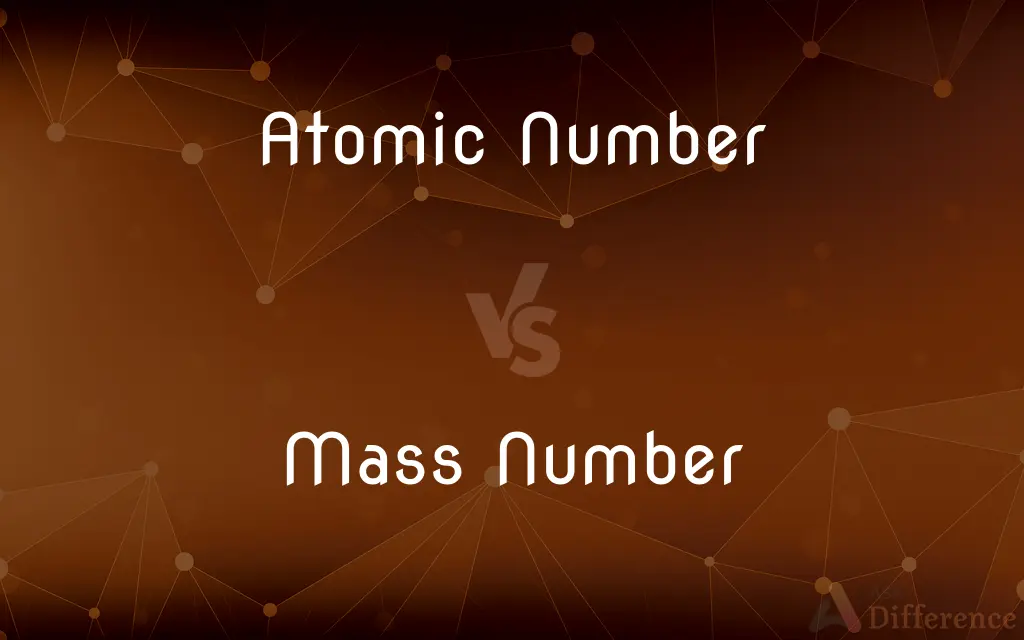Atomic Number vs. Mass Number — What's the Difference?
By Tayyaba Rehman — Published on November 27, 2023
The atomic number represents the number of protons in an atom's nucleus, while the mass number is the total of protons and neutrons combined.

Difference Between Atomic Number and Mass Number
Table of Contents
ADVERTISEMENT
Key Differences
The atomic number is a fundamental property of an atom, denoting the number of protons present in the nucleus. This determines the chemical element it represents. For instance, every atom with an atomic number of 1 is hydrogen. On the contrary, the mass number isn't unique to an element. It signifies the sum of protons and neutrons in an atom's nucleus, providing insight into its isotopes.
Different isotopes of an element will have the same atomic number but varying mass numbers. This is because while they contain an identical number of protons, they have different numbers of neutrons. The atomic number, therefore, dictates an element's place on the periodic table, while the mass number hints at its specific isotope.
While the atomic number is essential in defining the chemical properties of an element, the mass number plays a significant role in nuclear physics and chemistry. When you talk about atomic number, you're essentially referring to the element itself. In contrast, when discussing mass number, you're delving into the specifics of an atom's nucleus, particularly its isotopes.
A critical thing to understand is that the atomic number can't be changed without changing the element itself. But the mass number can vary within the same element due to differing neutron counts. To illustrate, carbon-12 and carbon-14 both have an atomic number of 6 (carbon), but their mass numbers are 12 and 14, respectively.
Comparison Chart
Definition
Number of protons
Sum of protons and neutrons
ADVERTISEMENT
Determines
Element's identity
Specific isotope
Variation within an element
Constant for a given element
Varies for different isotopes
Representation
Denoted by 'Z'
Denoted by 'A'
Changeability
Changes element
Doesn't change element
Compare with Definitions
Atomic Number
Atomic number is the count of protons in an atom.
Hydrogen has an atomic number of 1.
Mass Number
Mass number indicates a specific isotope of an element.
Carbon-12 and Carbon-14 have different mass numbers.
Atomic Number
Atoms of the same element always share the same atomic number.
Every oxygen atom has an atomic number of 8.
Mass Number
Mass number is represented by the symbol 'A'.
For carbon-12, A = 12.
Atomic Number
Atomic number represents an element's position on the periodic table.
Helium's position on the periodic table is determined by its atomic number, 2.
Mass Number
Mass number doesn't affect an atom's chemical properties.
Carbon-12 and Carbon-14 both chemically behave as carbon, despite having different mass numbers.
Atomic Number
Atomic number determines the element's identity.
All atoms with an atomic number of 2 are helium.
Mass Number
Mass number can vary among atoms of the same element.
Both carbon-12 and carbon-14 are isotopes of carbon, yet they have different mass numbers.
Atomic Number
Atomic number is denoted by the symbol 'Z'.
For helium, Z = 2.
Mass Number
Mass number is the total of an atom's protons and neutrons.
Helium has a mass number of 4 because it has 2 protons and 2 neutrons.
Common Curiosities
Can two different elements have the same atomic number?
No, the atomic number uniquely identifies an element.
What does the atomic number represent?
The atomic number represents the number of protons in an atom's nucleus.
What's the difference between atomic number and atomic mass?
While the atomic number is the count of protons, atomic mass considers the average mass of an element's isotopes.
Can changing the number of neutrons change the atomic number?
No, only altering the number of protons can change the atomic number.
What does the mass number indicate?
The mass number is the total of an atom's protons and neutrons.
Which one remains constant for a given element: atomic number or mass number?
The atomic number remains constant for a given element.
Why do isotopes of the same element have different mass numbers?
They have different numbers of neutrons, affecting their mass number but not their atomic number.
How can one determine the number of neutrons from the atomic number and mass number?
Subtract the atomic number from the mass number.
Can the same element have atoms with different mass numbers?
Yes, these are called isotopes.
Is the atomic number or mass number more essential in determining an element's chemical properties?
The atomic number, as it determines an element's identity and its place on the periodic table.
Are atomic number and atomic mass the same thing?
No, atomic number counts protons, while atomic mass considers the average mass of all isotopes.
Can mass number be a decimal?
No, the mass number is a whole number, representing total protons and neutrons.
Do isotopes have the same atomic number?
Yes, isotopes of the same element share the same atomic number but differ in mass number.
Are elements defined by their atomic number or mass number?
Elements are defined by their atomic number.
Is atomic number or mass number used to identify an element on the periodic table?
The atomic number is used to identify and place elements on the periodic table.
Share Your Discovery

Previous Comparison
Google Play Store vs. Google Play Services
Next Comparison
Piano vs. Casio KeyboardAuthor Spotlight
Written by
Tayyaba RehmanTayyaba Rehman is a distinguished writer, currently serving as a primary contributor to askdifference.com. As a researcher in semantics and etymology, Tayyaba's passion for the complexity of languages and their distinctions has found a perfect home on the platform. Tayyaba delves into the intricacies of language, distinguishing between commonly confused words and phrases, thereby providing clarity for readers worldwide.












































